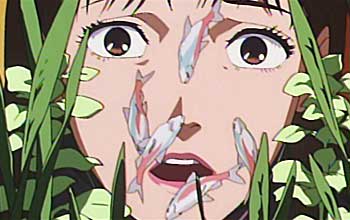
by Akadot Staff
The interview started on shaky ground, our questions about a diminishing anime industry brushed aside with their practiced, veteran calm accustomed to the rises and falls in this business. However, part way through the interview, the interviewees began asking the questions, which in turn broadened the scope of our discussion. This transcript has been edited in the interest of focusing the conversation. The three animators asked not to be identified for legal purposes and therefore will be referred to as X, Y and Z. Do you think that the insurgent demand in America for anime is shifting the focus towards what might sell in America, changing what Japanese animators are choosing to make? X: I don't think that studios purposely produce titles that are marketed or geared to the American market, unless we are specifically asked to do so by an American company. To be blatantly honest, when we produce titles, there is no such thing as "for a Japanese audience" or "for an American audience." We think about making a fun title. I personally have no intention of changing the way in which I produce my films so as to gear it toward specific groups. I don't know what other people think. Y: I don't think about marketing either. I will be very happy with the result of a title doing well in Japan, but not so well in the US or doing well in the US, but not so well in Japan. And I will be most happy if a title does well in both Japan and the US. The point is that a title does well because it is good. X: The parts that people will respond to most will definitely differ in each country. However, I believe that the essence of the story can be shared by both cultures. My wish and hope is that everyone in the world be able to enjoy my work. With video games being a fusion of increasingly more complex stories and increasingly more virtual interactivity, do you see this as either a threat, challenge, something you'd like to get into or something about which you're really not worried? X: There are many things that are enjoyable. Contrary to popular belief, fun is not confined to just anime. And game lovers might crossover to find anime fun. And it is good to have variety. I think that anime can learn a lot from video games and vice versa. And as long as industries can learn from one another then I think that storytelling can grow. Y: There are certainly differences in how you approach storytelling in each. For an anime, you have to squeeze character development into a limited time. A filmmaker can more precisely control how people react to the work. Games are not confined by that time frame, and so awkwardly fitting back story or explanations into a script isn't as much of a problem. An artist's entire imaginative world can fit into a video game, though that artist looses the ability to control where a player's attention goes. And games have definitely evolved. There are games with deeper stories now. There are games in which you can travel to different places. There are games in which you can pick your drama. There are games in which there are multiple stories within the game.
Americans like very conclusive endings that clearly express how a story ends. However, a lot of Japanese stories have open endings as though posing philosophical questions. Miyazaki's "Laputa" even Satoshi Kon's "Perfect Blue" have ambiguous ending. When you face the ending of a title, do you consciously reach for something challenging? X: Well, Japan certainly has its share of conclusive endings. And happy endings, such as in "Pokemon" and "Digimon." I think that the US and Japan differ when it comes to animation because Americans feel that animation is only for children and won't attempt to give a story a heavier ending. Z: So you're talking about story building. How Americans have a tendency to have more of a Hollywood appeal, even if the story is sad or happy. More of an ending in which there are no loose ends. Yes. X: I understand the feeling of content that people get when a story ends clearly. I love American films for that reason. The amount of Japanese animation and film stories that have definite endings is low, admittedly. But I don't think that kind of ending makes the story better or more enjoyable. I think that there are stories that are entertaining and end clearly. And there are others, equally as entertaining, that leave you hanging. There are films that are not so good that leave you hanging too. |


